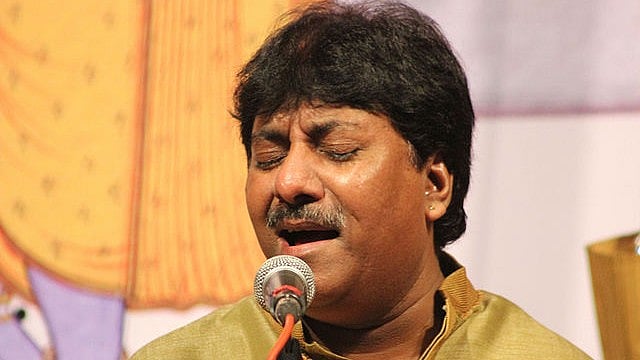
Ustad Rashid Khan.
Credit: Wikimedia Commons
What a phenomenal artiste he was, says Kuchipudi danseuse Kaushalya Reddy, talking about the 55-year-old legendary music maestro, Ustad Rashid Khan, who succumbed to prostate cancer this week in Kolkata. She recalls the time when dance gurus Raja Radha Reddy had introduced a young Khan in the series ‘Bhavishya’, which was a part of their annual dance festival ‘Parampara’ in the early 2000s.
The young artiste was presented by the Reddys as the future of Indian classical music — something that the legendary Pt Bhimsen Joshi had also called him! Khan performed for them once again “a little before corona and both times, the audience was left spellbound. Really, one had to see the response he got to believe it,” recalls Kaushalya Reddy talking about music lovers who were charmed by his style of singing much before ‘Aaoge jab tum o saajna’ hit the music charts.
Belonging to the Rampur-Sahaswan gharana, the Padma Bhushan awardee and great-grandson of the gharana founder, Inayat Hussain Khan, started performing on stage from the age of 11. He leaves behind his wife, two sons, and a daughter.
“But, very few people, it seems, knew about his ongoing battle with cancer. I’d heard about it but upon asking a common friend, was told it’s just a rumour,” informs Reddy. She smiles remembering the brief chat she had with him over the phone just a few months ago: “He was cooking at the time and when I mentioned that I’d heard a lot about his culinary skills (especially with mutton), he laughed saying he’ll prepare a meal for me whenever I visit Kolkata next. Alas, that was not to be! And now, all I can say is that with his passing, a great vacuum has been created in the world of music.”
Calling Ustad Rashid Khan one of the greatest singers of his generation, Shobha Deepak Singh, director of the Bhartiya Kala Kendra, says, “I’ve been in a state of shock ever since I heard this news.” The last she had met Khan was when he had performed at her famous Bhartiya Shankarlal Music Festival in February, 2023. “To say that the hall was packed would be an understatement. People not just made space for themselves in the aisles, but were also standing outside the auditorium just to hear him sing,” adds Singh.
The music maestro, adds senior classical dancer Manjusree Chatterjee, “would sing even ‘thumris’ in a ‘theth’, classical style which was a treat for all ‘sangeet rasiks’”. Talking about the above-mentioned festival, she recalls, “His renditions of ‘Baajuband khul khul jaye’ and ‘Kya karun sajani’ had everyone floored. Indeed, his voice, singing and presentation always took one back to the music of great gurus like Bade Ghulam Ali Khan saab and Amir Khan saab.”
Just a day before he passed on, tabla maestro Swapan Chaudhuri who had come to Chatterjee’s place for a visit, gave her the news that Rashid Khan was suffering from cancer and was on the ventilator. “This was truly shocking for me as he was still very young! Then I was telling Swapan how I had first met Rashid at SRA (Sangeet Research Academy) in Kolkata and he came across as a very nek insaan.”
“Ustad Rashid Khan still had a lot to give to the music world,” agrees Shovana Narayan, kathak danseuse, who remembers meeting him “when he was barely 16-17 years old at a concert where he was also performing. Despite his early years, one could see the spark in him. And when he started performing, everyone felt that this young lad would go far. And indeed, he did!”
In later years, Narayan says she often met Khan at various concerts. “This was mostly in the green room and he was always very courteous, extremely respectful. There was never a hint of arrogance in him that one sometimes comes across in some of today’s youngsters.”
“Yes, Rashid bhai was far from being arrogant,” adds classical singer Sunanda Sharma. “A man of few words, he was very affectionate and encouraging to younger artistes like me”. Having known Rashid Khan since the early 1990s when she became a student of the great ‘Queen of Thumri’ Girija Devi, she says, “Since Appaji regarded him as her son, Rashid bhai was like an elder brother to me,” says Sharma.
Later, as she recalls, “Whenever we would meet at festivals, he would always ask about Appaji; and after her passing on, would say, ‘Un se bahut kuch seekha’ and remember the good old times spent with her.”
Unlike many other artistes who often give lengthy descriptions about the ragas they present on the stage, Sharma says that the Ustad would be “extremely brief -- he would just announce the name of the raga and start singing. “He just let his music speak for itself. And indeed, music connoisseurs would immediately connect with his talent, his amazing style of singing that one can say was full of gravity and mysticism.”
Here, like Shovana Narayan, she too has a question: “Why is it that lately we’ve been losing so many of our revered, talented artistes due to some illness or the other?”